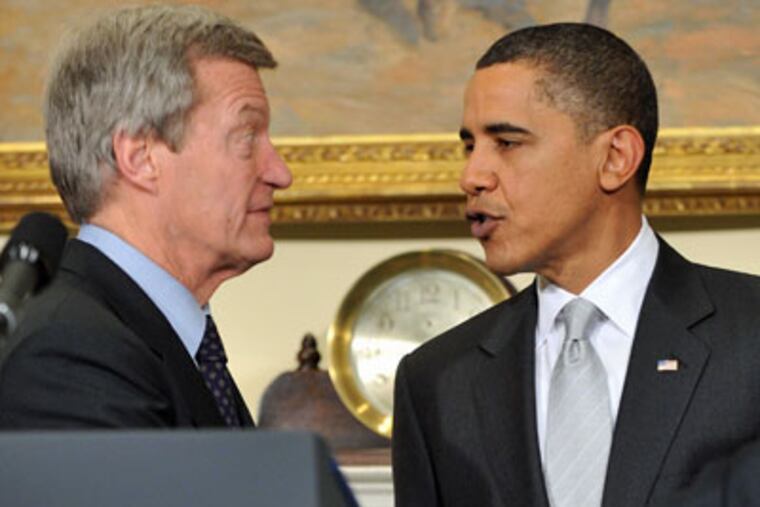Obama presses health care bill
Saying historic approval was in reach, he urged senators to put aside lingering differences.

WASHINGTON - Prodded by President Obama, Senate Democrats won tentative backing from one holdout and worked intensely to satisfy another yesterday as they grappled with the last, lingering disputes blocking passage of health-care legislation by Christmas.
Despite the push, Sen. Ben Nelson of Nebraska remained publicly uncommitted, even after a private meeting with Obama.
At the White House, Obama said his congressional allies were "on the precipice" of a historic accomplishment that has eluded presidents and lawmakers for generations, adding that the emerging bill included "all the criteria that I laid out" in a speech to a joint session of Congress earlier in the year.
"It is deficit-neutral," he said. "It bends the cost curve. It covers 30 million Americans who don't have health insurance, and it has extraordinary insurance reforms in there to make sure that we're preventing abuse."
In the privacy of a presidential meeting, liberal supporters of the bill vented their frustration at having to abandon the last vestige of a government-run insurance option in the legislation, a slow-motion concession made over many months, most recently to moderates including Sen. Joe Lieberman (I., Conn.).
Two days after jolting the leadership by threatening to oppose the measure if it included an expansion of Medicare, Lieberman said that with the agreed-upon changes, "I'm going to be in a position where I can say what I've wanted to say all along, that I'm ready to vote for health-care reform."
That left Nelson, the only known holdout among the 60 senators who are members of the party's caucus, a group that includes 58 Democrats, Lieberman, and Sen. Bernie Sanders (I., Vt.).
Nelson already has won key concessions from Majority Leader Harry Reid, including an agreement to leave in place the insurance industry's exemption from antitrust laws. He also is seeking changes to increase restrictions on abortion coverage in a new insurance marketplace the bill would establish.
"I have spoken with the president, and he knows they are not wrapped up today," Nelson said of the changes he wants. Later, the normally talkative Nebraskan avoided reporters after casting a series of votes on the Senate floor.
The White House meeting unfolded as Democrats awaited a final cost analysis from the Congressional Budget Office on the latest version of the bill, and the full Senate rejected an amendment to permit the importation of prescription drugs from Canada and elsewhere. The vote was 51-48, short of the 60 required. Among Philadelphia-area senators, Arlen Specter (D., Pa.) voted for the amendment; the five other senators voted against it.
In the complicated politics of the moment, that counted as a victory for the bill, since the drug industry opposes importation but is working with the White House to pass the overhaul effort.
Sen. Byron L. Dorgan (D., N.D.), who had pushed the change, said it was a loss for consumers. "This is not over," he said, "and it's never going to be over as long as Americans pay the highest prices in the world" for drugs.
At its core, the health-care legislation is designed to spread coverage to 30 million Americans who now lack it, impose new consumer-friendly regulations on the insurance industry, and slow the rate of growth in health-care spending nationally. Most Americans would be required to purchase insurance, and the government would establish a new series of "exchanges" through which consumers could shop for policies.
The measure includes hundreds of billions of dollars in subsidies to defray the cost of insurance for families with incomes up to about $88,200 a year for a family of four. Additional assistance would go to small businesses to help them afford coverage for workers.
The White House meeting followed an intense two days in which Democrats struggled - apparently successfully - to keep the legislation moving forward despite a flare-up over a proposal to expand Medicare to uninsured people as young as 55. Lieberman announced Sunday he opposed the proposal. He threatened to join Republicans in voting against the overall measure if it stayed in the bill, and while no formal announcement has been made, officials said he had prevailed.
With Obama urging lawmakers to look beyond disappointments they may have about parts of the legislation, several Democrats said that in the private session, liberals lamented the absence of a government-run insurance option they had long sought. "There was frustration and angst," said Sen. Jay Rockefeller (D., W.Va.).
Obama, in his remarks, took issue with assertions by critics about the bill's impact on the federal budget, citing earlier CBO estimates that predicted it would reduce the deficit. "So all the scare tactics out there, all the ads that are out there are simply inaccurate," he said.
"There are still disagreements that have to be ironed out," Obama said. "There is still work to be done in the next few days."
But in a clear signal of his commitment to the bill, he said: "I told my former colleagues today . . . that we simply cannot allow differences over individual elements of this plan to prevent us from meeting our responsibility to solve a long-standing and urgent problem for the American people."
The House approved its version of the bill - with public option - earlier this fall, and final negotiations between the two houses would follow a vote in the Senate.